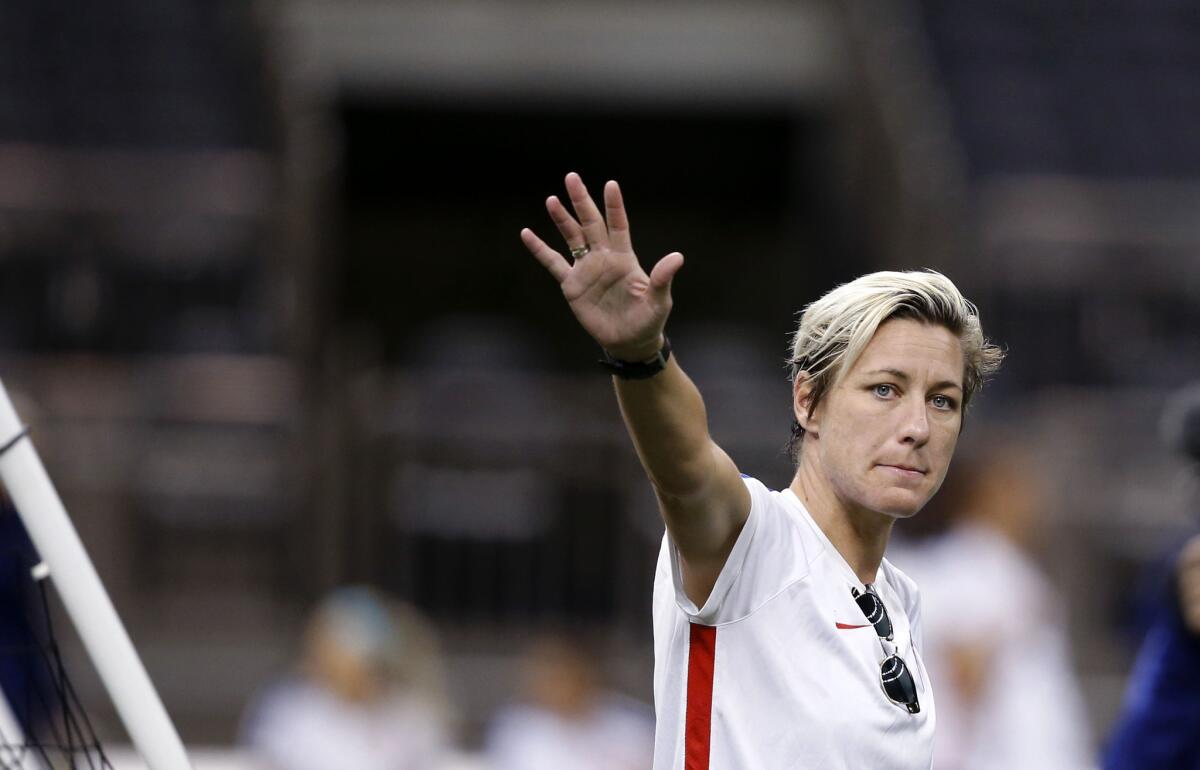U.S. women take a stand over pay equity, sending ripples through soccer’s world

Former national team captain Abby Wambach has been at the forefront of the women’s fight for equality with U.S. Soccer.
- Share via
After practicing law for more than three decades, Rich Nichols has developed a feel for which cases are going to fly and which are going to die. So he admits he had some trepidation about a plan for members of the women’s national team to file a pay-equity complaint against U.S. Soccer this spring.
“To file a wage-discrimination case against your current employer — you kidding me?” said Nichols, executive director and general counsel for the Women’s National Team Players Assn.
The players had no such doubts.
“There was no hesitation at all. None,” Nichols said. “Like, ‘Where do we sign?’ They are an incredible, strong, selfless group of women. End of story.”
Well, not quite, because the final chapter is still being crafted. But just the fact that the U.S. team is telling its story is already sending ripples through global soccer, where women have long been ignored, marginalized and discriminated against.
The union and U.S. Soccer continue to battle on two fronts: in a federal court in Chicago, where a dispute over an expired collective bargaining agreement is being fought, and with the Equal Employment Opportunity Commission, which is investigating the wage-disparity issue.
Attorneys for the players trot out figures showing the men received far more for games — as much as $17,625 to $1,350 for the women — public appearances and per diem, even though, the lawyers say, the women’s team was “almost exclusively” responsible for a projected profit of nearly $18 million last year in connection with the two teams.
U.S. Soccer countered with figures from a four-year cycle that includes the last men’s World Cup, figures that show the men brought in twice as much money as the women.
A ruling over the disputed collective bargaining agreement is expected next month, while the EEOC investigation could take months. A boycott of this summer’s Olympic Games in Brazil could also become part of the mix before it’s all over.
Set aside the “he said, she said” nature of the legal cases, though, and another narrative emerges. These women, as President Obama said last fall, “are badass.”
“They feel as if it’s their responsibility to take the women’s game to the next level. And they’re in a position where they can do it,” Nichols said.
Never mind the fact that four of the five players to sign the EEOC complaint will be at least 31 by the Olympics, making it possible that the Rio de Janeiro Games will mark their last major international tournament. Whatever victories the team wins in court will provide only limited benefits for Hope Solo, Becky Sauerbrunn, Carli Lloyd and Megan Rapinoe. (Alex Morgan, the fifth complainant, is 26.)
Yet they took a stand just the same — just as they did before last summer’s World Cup when former U.S. captain Abby Wambach headed a group of international players that sued FIFA and the Canadian Soccer Federation over plans to play that tournament completely on artificial turf.
FIFA didn’t budge and the women eventually withdrew the suit rather than disrupt the games. They’re making no such promises this time, with Sauerbrunn insisting a July vote over an Olympic boycott is possible.
But if the women have much to gain in pressing their case, they also have much to lose. A gold medal in Brazil this summer would be the fourth in a row for the reigning world champions, making it the first team to win a World Cup and Olympic title in consecutive years.
An Olympic boycott would also cause the TV audience for women’s soccer, which approached 27 million for last July’s World Cup final, to vanish, taking with it the kind of lucrative sponsorship deals that made Solo and Morgan millionaires.
Nichols says the women consider that a worthwhile sacrifice.
“This team has already started down the path of being finished with the inequities,” he said. “They want to move the sport forward.”
Not just in the U.S. but around the world as well.
A FIFA survey released last year found that one-fifth of the 177 national federations responding to the questionnaire didn’t have a women’s national team and half had no youth national teams for girls. Globally, national federations spend just $156 million each year on women’s soccer; FIFA spent that much on prize money for the top eight teams in 2014 men’s World Cup.
And it’s not just developing programs that have suffered. Australia’s team, a World Cup quarterfinalist that is ranked fifth in the world, went on strike last fall over salaries and working conditions. Colombia’s players, who reached the knockout round of last summer’s World Cup, recently went four months without a paycheck.
At least they have a salary. Costa Rica doesn’t pay all its women and the federation has yet to fork over the $2,000 bonus each player was supposed to receive for getting the country into its first World Cup last year.
And we’re just talking about national teams here. At the club level, women often have to pay to play, working odd side jobs to make ends meet.
These are all inequities the U.S. women have underscored in their own fight, forcing an embarrassed FIFA to pledge a doubling in spending on women’s soccer by 2018. World soccer’s governing body has also adopted a series of reforms pushed by Moya Dodd, vice president of the Asian confederation, one of which requires a minimum of six women on FIFA’s 36-member ruling council.
“Simply put, we’re sick of being treated like second-class citizens. It wears on you after a while. And we are done with it,” Lloyd, the women’s world player of the year, wrote in the New York Times last month.
“We’re not backing down any more.”
Follow Kevin Baxter on Twitter: @kbaxter11.
ALSO
At the Galaxy’s school, soccer is hardly the only subject
City Council approves plans for privately financed soccer stadium next to Coliseum
Leicester beats 5,000-to-1 odds to win Premier League title for first time in 132-year history
More to Read
Go beyond the scoreboard
Get the latest on L.A.'s teams in the daily Sports Report newsletter.
You may occasionally receive promotional content from the Los Angeles Times.





